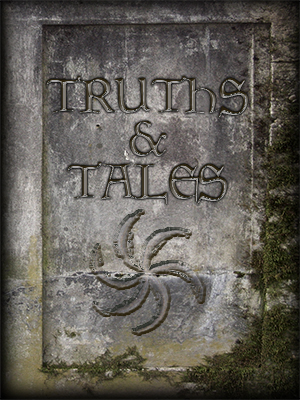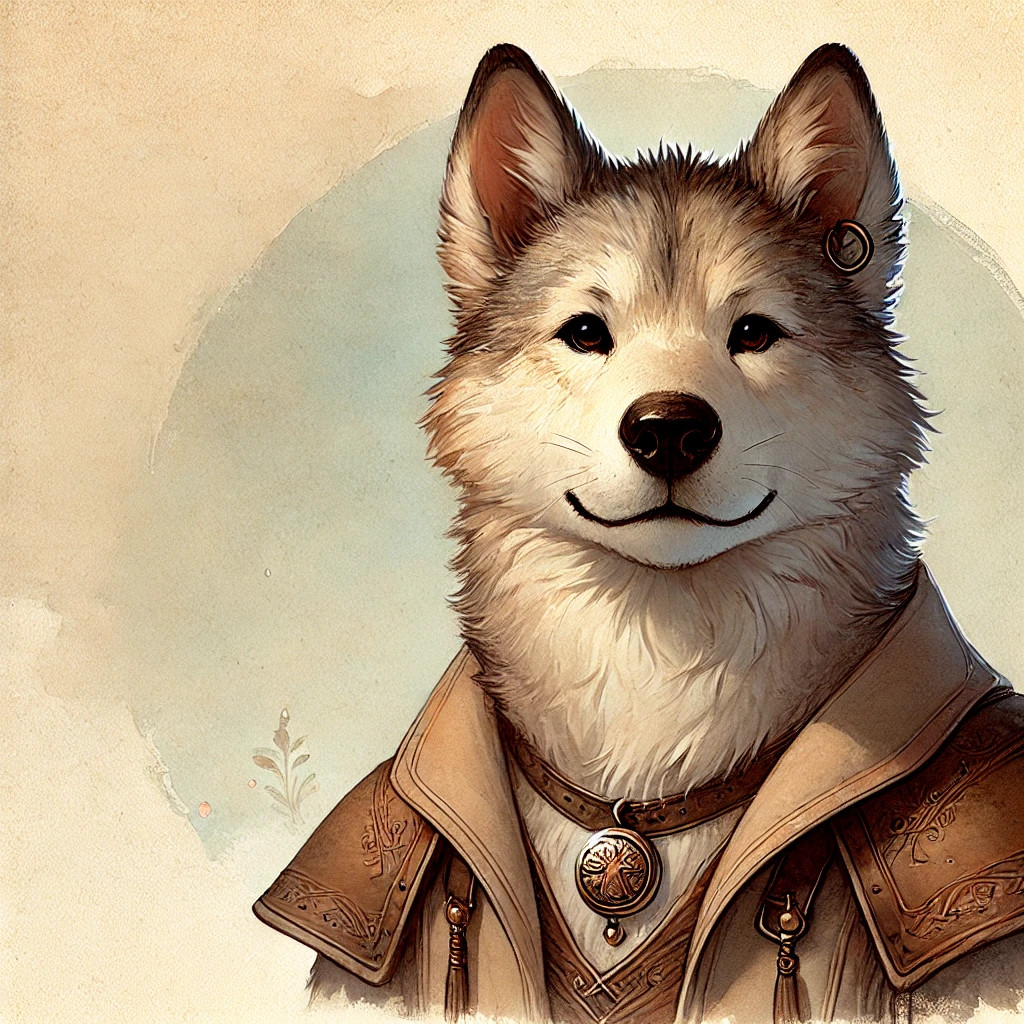Flute at the Bottom
Erandus Carver was my roommate in the dormitory at Gri’x University, decades ago. He was a mediocre student, not as driven as he should have been, but a fine man, amicable and quick-witted. He would have made a good laboratory assistant, should he have completed the science curriculum.
We were all surprised when he disappeared just before the final exams. It was hardly uncharacteristic of him, though, and we assumed that he’d simply grown weary of the collegiate life and set off for other dimensions. We packed up his things, his family came to collect them, and that was the last any of us heard of it.
It has been decades since I graduated from the University. Last week, at the urgings of my spouse, I was going through a box of my old textbooks (I find it unthinkable to let go of books, even those I haven’t needed in years), when I discovered Carver’s Biology 200 text mixed in among my own things. We must have missed it when we packed.
I pulled the book out and perused it, laughing to myself at Carver’s irreverent scribblings among the paragraphs and diagrams. Had he spent as much time studying as he did composing clever remarks about the subject, he would have had a better time of it.
On the pages of the last chapter, though, his little jokes stopped and his thoughts seemed to grow dark. Finally, scrawled across the final two blank flyleaves, I found this account. He must have written it shortly before he left. I’ve no idea how much of it could be true, or if his imagination was only stretching its wings before he himself took flight.
I shall here present his account in its entirety. Perhaps someone who knows more about such things than I will read this and contact me with an explanation.
I must tell someone. No one will believe me—what of it? I know my own experiences. Does truth create belief, or is belief the incubator of new truths? Does it matter? Fate crossed my path in the Gri’x Public Library’s Infinite Stacks. We were studying bacterium that week in Professor Krauft’s biology class, and the wizened old magister had posed a number of questions that could not be answered from the textbook, hoping that her students would gain a deeper understanding of the topic by researching actual historical experiments. I had resigned myself to an afternoon among the back shelves, thumbing through obscure old notebooks and journals. After some time and a great deal of dust in my throat, I found a likely source: Lactobacillus and Friends: Digesting Together For a Time. It was little more than a glorified laboratory notebook, its author unsung, but a cursory glance through its yellowed pages made me think that it might hold something that would please Professor Krauft. In any case, I was determined to wrest something from it even if I had to extrapolate and exaggerate, for the shadows outside had grown long, and I was eager to get back to my room. As I thumbed through the notes, I noticed a few loose, brittle pages inside, gathered unevenly and tucked in an appendix of analytical tables. I assumed this was nothing more than supplementary data the author had added later. But when I removed the sheets—carefully, for they were already crumbling at the edges—I noted that the ink seemed much older than the notebook’s neat ball-point lines, and the handwriting was quite different, with a few hastily-sketched diagrams that made my head spin. This I attributed to hunger, and thinking more of my supper waiting in the dormitory mini-fridge than the words on the page, I began to read: “When The Whorls meet in the center, their axis crossed by a dark moon, the eye of madness opens and looks upon the Gri’x,” it said. “Approacheth not thy larders on the night of the single Whorl, and open not thy pantry while the black eye is awake, for this is the time of the hungry ones, the old ones, the wailing ones whose cupboards are ever barren and whose bellies hold only the piper’s infinite notes, and they will seek their own sustenance, the swirling pablum of the...” It is but a recipe booklet, I thought, laughing as I read the first lines. Dear gods, yes, I actually laughed. I was only a student, my mind packed full of science, math, functional magix, and all such stalwart facts. I believed myself already sated, that there was no room left in my head to entertain such myths and superstitions with any degree of credulity. I had the book I needed for the assignment, and the extra pages would definitely make for an evening’s entertainment when we were all back in the dorm, and so I departed the Library and returned to my room. The sun was setting when I reached the dormitory. I was somewhat dismayed to find no one in the hall—I remembered, then, that my friends had all planned to go out to watch some once-in-a-generation cosmic light show. Katrinia, the astronomy major, had been talking about it for a month, and I supposed she’d finally convinced everyone in our hall to accompany her to the high cliffs above the city to see the spectacle. Quite frankly, astronomy is not my field, and I could think of better ways to spend an evening than with my neck craned uncomfortably skyward, so I was glad that they’d left without me. The amusing pages I’d found could wait until they all returned in high spirits. I set my books on the small table and opened the mini-fridge to retrieve my dinner, only to find the shelves empty except for a sparse hoard of healthy snacks belonging to my room-mate, Hermius Poulluf. He must have eaten my food. It would not have been the first time. Suddenly I was too tired, too hungry, and, quite frankly, too annoyed to go out and get something else. In any event, Poulluf’s stores, such as they were, were now mine by default. I resigned myself to a few dry carrot-sticks, bottled lemon water, and a plastic cup of some kind of milky fruit-mush. I had thought to work on Professor Krauft’s assignment while I ate, but my soured mood and the tedium of the subject sent my mind wandering back to the loose pages again: “Fear the galleys and avoid the icy box when the twin spirals spin as one, and shun the spoon when the dark moon looks down. Close your mouth. Look not upon the repast, for it is the time when the Elders of the Iterations take up their ladles. They will have their share.” What nonsense! I barked out a laugh, my voice sounding sudden and sharp in the silent hall. I thought I heard another sound, though: an undertone to my outburst. Low and grumbling, it was, like a rattle in the vent or the echo of a clogged drain on another floor. “...In the frigid chambers have the Old Ones slept for ages, but lo—they shall break their fast as the piper plays the song of madness at the bottom of the void, and they shall sweep the fattened souls of the errant scavengers into their gaping maws. Then thou shalt chant thy pleas to the hidden sun, IA MARUTUKKU, IA MARDUK, ZI DINGIR..." Now my eyes really were crossing. The rest of the text was only more gibberish. The handwriting becoming quite illegible by the last few lines, as if the scribe’s mind was reeling along, too far ahead of their hand, and I decided I’d had enough of it for now. When I leaned over to shove my empty plastic dishes across the table, I heard the growling noise again—it was my stomach. Damn you, Poulluf, I thought. How long had that stuff been sitting in there? I felt fine, though, if a little woozy—a notion I attributed to too many hours spent among dusty laboratory books. And if I didn’t complete this assignment tonight, I’d have to return and do it all over again tomorrow. Thus resolved to my goal, I set the strange inserts aside and focused my attention on the researcher’s notes. Now there was music in the hallway beyond my door. Some experimental, atonal flute concerto—someone must have returned to the dorms while I was eating and put their stereo on. If it kept up, I would have to track them down and demand silence, for the wheedling, wandering notes were making it difficult to concentrate. In the appendix where I’d found the extra pages, I noticed some odd stains splattered across the analytical tables. My guts roiled again and I wondered, briefly, what noxious chemicals or venerable spores I might have been inhaling all through my meagre, unsatisfying supper. I stood up and took the book to the small sitting area, where the overhead light would give me a better look. Before I could pull the chain switch, though, I happened to glance out the window—as if on cue, my innards lurched painfully to one side of my ribcage when I realized what I was seeing in the sky above the Triamble. I fell, knocking my head against the side-table, and slipped into unconsciousness, where I remained until Poulluff came back with several friends after a night of sky-watching and merry-making. They were laughing as they shook me awake, thinking that I had had my own party in their absence. I was not at all myself when I came to. I was more irritated than ever. And I was hungry. “Come on, Carver,” Poulluf was laughing as he attempted to pull me up by my shoulders. “How much did you drink, man? Is the room spinning?” Not the room, but my head—the vision that had wrenched me side-wards was still burned into my eyes, perhaps into the very tissues of my brain. For just before my fall, I had seen the two Great Whorls in the Gri’xian sky, shifting, spinning slowly, one conjunct the other, and in their center, a dark spot where the New Moon had joined them. And there was Poullof, looming over me, grinning stupidly, his face but inches from my own. I suddenly wanted to bite him, to grind my teeth into his flesh, to swallow him whole. It would serve him right. He’d eaten my dinner, and left me but a poor cup of spoiled yogurt in return. Would it not be fair, then, for me to exact a more meaty payment? And our friends, staring, pointing, laughing, cajoling—they would be next. But how could they even hear one another’s clever little repartee, with that music now blasting at full volume throughout the building? Was the musician in the basement, playing straight into the ductwork, so that the discordant noise echoed and reverberated through every room and echoed off of every surface? Could they not hear that? Should I tear their ears from their heads, bore down into their skulls, make the holes bigger, so that they might be able to— I say to you, this was not me. In a moment of clarity, I understood that these were not my thoughts. Some monstrous bacterium or fungus must have taken up residence in my intestines, attempting to control my mind and my actions. I would have to control myself, my panic, my ravening urges. I made my excuses and ran from the room, barely making it to the hallway before nearly toppling over again as the whole building seemed to tilt and sway beneath my feet. If my friends called to me as I ran, I could not hear them, for the maddening song played on and on, drowning out any words of comfort or concern. In the courtyard outside, I forced myself to regurgitate what little remained in my stomach behind a hydrangea bush, and then I passed out again. The next morning, my chagrin at waking up in the hydrangea notwithstanding, I felt somewhat better. I had missed Professor Kraught’s class, and my homework would be late, but I thought I could get a doctor to sign an excuse form for me—clearly, I’d had a bad case of food poisoning. I could hardly be held responsible. But when I crept out of the bushes, blinking and wincing in the sunny morning haze, the crowds of students crossing the Triamble seemed wrong. Smaller, somehow, and ridiculous, and silly. Chattel. Fit to serve as nothing more than sustenance for some greater being. My guts were still grumbling. Of course I went straight-away to the campus’ medical office, where a doctor diagnosed me as over-stressed, and recommended that I take some time off “for fun.” But what, now, could be considered fun? It has been three days since that night. I have tried to abide by my routine, but I cannot focus on the lectures, and those whom I called friends before now grate on my nerves with their little worldly concerns and their bland, short-sighted humor. I can feel the warmth of their flesh from across a room, I can sense the thrumming of their tender hearts, and I can practically taste... I mustn’t think like that. My mind keeps returning to those strange passages in the loose pages and my vision of the Whorls crossing one another in the sky. And there is still, still, in my mouth, the ever-present under-taste of the contents of that cup, and the music is still playing, somewhere, the flautist squealing away in the depths of some dark dimension that only I can hear. And no matter what I eat, or how much, I am still hungry.
Here Carver’s account ends. He must have left right after setting it down. I have contacted all of our old friends with whom I still keep in touch, and no one else has heard from him since that night. As I said, his disappearance wasn’t entirely uncharacteristic, but in light of these strange passages, it does give one pause. I admit that I did eat the food he’d had in our mini-fridge. I thought nothing of it at the time; we often shared our groceries. I had meant to replace it the next day, and had I known he had nothing else, I would have bought him something from the campus cafeteria. But—other than the dry carrot-sticks he mentioned, I had nothing else in the fridge myself. Whatever it was in that plastic cup, it was not mine, and I never found it in the room afterwards, nor the research notebook with the loose pages.
I must tell someone. No one will believe me—what of it? I know my own experiences. Does truth create belief, or is belief the incubator of new truths? Does it matter? Fate crossed my path in the Gri’x Public Library’s Infinite Stacks. We were studying bacterium that week in Professor Krauft’s biology class, and the wizened old magister had posed a number of questions that could not be answered from the textbook, hoping that her students would gain a deeper understanding of the topic by researching actual historical experiments. I had resigned myself to an afternoon among the back shelves, thumbing through obscure old notebooks and journals. After some time and a great deal of dust in my throat, I found a likely source: Lactobacillus and Friends: Digesting Together For a Time. It was little more than a glorified laboratory notebook, its author unsung, but a cursory glance through its yellowed pages made me think that it might hold something that would please Professor Krauft. In any case, I was determined to wrest something from it even if I had to extrapolate and exaggerate, for the shadows outside had grown long, and I was eager to get back to my room. As I thumbed through the notes, I noticed a few loose, brittle pages inside, gathered unevenly and tucked in an appendix of analytical tables. I assumed this was nothing more than supplementary data the author had added later. But when I removed the sheets—carefully, for they were already crumbling at the edges—I noted that the ink seemed much older than the notebook’s neat ball-point lines, and the handwriting was quite different, with a few hastily-sketched diagrams that made my head spin. This I attributed to hunger, and thinking more of my supper waiting in the dormitory mini-fridge than the words on the page, I began to read: “When The Whorls meet in the center, their axis crossed by a dark moon, the eye of madness opens and looks upon the Gri’x,” it said. “Approacheth not thy larders on the night of the single Whorl, and open not thy pantry while the black eye is awake, for this is the time of the hungry ones, the old ones, the wailing ones whose cupboards are ever barren and whose bellies hold only the piper’s infinite notes, and they will seek their own sustenance, the swirling pablum of the...” It is but a recipe booklet, I thought, laughing as I read the first lines. Dear gods, yes, I actually laughed. I was only a student, my mind packed full of science, math, functional magix, and all such stalwart facts. I believed myself already sated, that there was no room left in my head to entertain such myths and superstitions with any degree of credulity. I had the book I needed for the assignment, and the extra pages would definitely make for an evening’s entertainment when we were all back in the dorm, and so I departed the Library and returned to my room. The sun was setting when I reached the dormitory. I was somewhat dismayed to find no one in the hall—I remembered, then, that my friends had all planned to go out to watch some once-in-a-generation cosmic light show. Katrinia, the astronomy major, had been talking about it for a month, and I supposed she’d finally convinced everyone in our hall to accompany her to the high cliffs above the city to see the spectacle. Quite frankly, astronomy is not my field, and I could think of better ways to spend an evening than with my neck craned uncomfortably skyward, so I was glad that they’d left without me. The amusing pages I’d found could wait until they all returned in high spirits. I set my books on the small table and opened the mini-fridge to retrieve my dinner, only to find the shelves empty except for a sparse hoard of healthy snacks belonging to my room-mate, Hermius Poulluf. He must have eaten my food. It would not have been the first time. Suddenly I was too tired, too hungry, and, quite frankly, too annoyed to go out and get something else. In any event, Poulluf’s stores, such as they were, were now mine by default. I resigned myself to a few dry carrot-sticks, bottled lemon water, and a plastic cup of some kind of milky fruit-mush. I had thought to work on Professor Krauft’s assignment while I ate, but my soured mood and the tedium of the subject sent my mind wandering back to the loose pages again: “Fear the galleys and avoid the icy box when the twin spirals spin as one, and shun the spoon when the dark moon looks down. Close your mouth. Look not upon the repast, for it is the time when the Elders of the Iterations take up their ladles. They will have their share.” What nonsense! I barked out a laugh, my voice sounding sudden and sharp in the silent hall. I thought I heard another sound, though: an undertone to my outburst. Low and grumbling, it was, like a rattle in the vent or the echo of a clogged drain on another floor. “...In the frigid chambers have the Old Ones slept for ages, but lo—they shall break their fast as the piper plays the song of madness at the bottom of the void, and they shall sweep the fattened souls of the errant scavengers into their gaping maws. Then thou shalt chant thy pleas to the hidden sun, IA MARUTUKKU, IA MARDUK, ZI DINGIR..." Now my eyes really were crossing. The rest of the text was only more gibberish. The handwriting becoming quite illegible by the last few lines, as if the scribe’s mind was reeling along, too far ahead of their hand, and I decided I’d had enough of it for now. When I leaned over to shove my empty plastic dishes across the table, I heard the growling noise again—it was my stomach. Damn you, Poulluf, I thought. How long had that stuff been sitting in there? I felt fine, though, if a little woozy—a notion I attributed to too many hours spent among dusty laboratory books. And if I didn’t complete this assignment tonight, I’d have to return and do it all over again tomorrow. Thus resolved to my goal, I set the strange inserts aside and focused my attention on the researcher’s notes. Now there was music in the hallway beyond my door. Some experimental, atonal flute concerto—someone must have returned to the dorms while I was eating and put their stereo on. If it kept up, I would have to track them down and demand silence, for the wheedling, wandering notes were making it difficult to concentrate. In the appendix where I’d found the extra pages, I noticed some odd stains splattered across the analytical tables. My guts roiled again and I wondered, briefly, what noxious chemicals or venerable spores I might have been inhaling all through my meagre, unsatisfying supper. I stood up and took the book to the small sitting area, where the overhead light would give me a better look. Before I could pull the chain switch, though, I happened to glance out the window—as if on cue, my innards lurched painfully to one side of my ribcage when I realized what I was seeing in the sky above the Triamble. I fell, knocking my head against the side-table, and slipped into unconsciousness, where I remained until Poulluff came back with several friends after a night of sky-watching and merry-making. They were laughing as they shook me awake, thinking that I had had my own party in their absence. I was not at all myself when I came to. I was more irritated than ever. And I was hungry. “Come on, Carver,” Poulluf was laughing as he attempted to pull me up by my shoulders. “How much did you drink, man? Is the room spinning?” Not the room, but my head—the vision that had wrenched me side-wards was still burned into my eyes, perhaps into the very tissues of my brain. For just before my fall, I had seen the two Great Whorls in the Gri’xian sky, shifting, spinning slowly, one conjunct the other, and in their center, a dark spot where the New Moon had joined them. And there was Poullof, looming over me, grinning stupidly, his face but inches from my own. I suddenly wanted to bite him, to grind my teeth into his flesh, to swallow him whole. It would serve him right. He’d eaten my dinner, and left me but a poor cup of spoiled yogurt in return. Would it not be fair, then, for me to exact a more meaty payment? And our friends, staring, pointing, laughing, cajoling—they would be next. But how could they even hear one another’s clever little repartee, with that music now blasting at full volume throughout the building? Was the musician in the basement, playing straight into the ductwork, so that the discordant noise echoed and reverberated through every room and echoed off of every surface? Could they not hear that? Should I tear their ears from their heads, bore down into their skulls, make the holes bigger, so that they might be able to— I say to you, this was not me. In a moment of clarity, I understood that these were not my thoughts. Some monstrous bacterium or fungus must have taken up residence in my intestines, attempting to control my mind and my actions. I would have to control myself, my panic, my ravening urges. I made my excuses and ran from the room, barely making it to the hallway before nearly toppling over again as the whole building seemed to tilt and sway beneath my feet. If my friends called to me as I ran, I could not hear them, for the maddening song played on and on, drowning out any words of comfort or concern. In the courtyard outside, I forced myself to regurgitate what little remained in my stomach behind a hydrangea bush, and then I passed out again. The next morning, my chagrin at waking up in the hydrangea notwithstanding, I felt somewhat better. I had missed Professor Kraught’s class, and my homework would be late, but I thought I could get a doctor to sign an excuse form for me—clearly, I’d had a bad case of food poisoning. I could hardly be held responsible. But when I crept out of the bushes, blinking and wincing in the sunny morning haze, the crowds of students crossing the Triamble seemed wrong. Smaller, somehow, and ridiculous, and silly. Chattel. Fit to serve as nothing more than sustenance for some greater being. My guts were still grumbling. Of course I went straight-away to the campus’ medical office, where a doctor diagnosed me as over-stressed, and recommended that I take some time off “for fun.” But what, now, could be considered fun? It has been three days since that night. I have tried to abide by my routine, but I cannot focus on the lectures, and those whom I called friends before now grate on my nerves with their little worldly concerns and their bland, short-sighted humor. I can feel the warmth of their flesh from across a room, I can sense the thrumming of their tender hearts, and I can practically taste... I mustn’t think like that. My mind keeps returning to those strange passages in the loose pages and my vision of the Whorls crossing one another in the sky. And there is still, still, in my mouth, the ever-present under-taste of the contents of that cup, and the music is still playing, somewhere, the flautist squealing away in the depths of some dark dimension that only I can hear. And no matter what I eat, or how much, I am still hungry.
Here Carver’s account ends. He must have left right after setting it down. I have contacted all of our old friends with whom I still keep in touch, and no one else has heard from him since that night. As I said, his disappearance wasn’t entirely uncharacteristic, but in light of these strange passages, it does give one pause. I admit that I did eat the food he’d had in our mini-fridge. I thought nothing of it at the time; we often shared our groceries. I had meant to replace it the next day, and had I known he had nothing else, I would have bought him something from the campus cafeteria. But—other than the dry carrot-sticks he mentioned, I had nothing else in the fridge myself. Whatever it was in that plastic cup, it was not mine, and I never found it in the room afterwards, nor the research notebook with the loose pages.







Bravissimo!